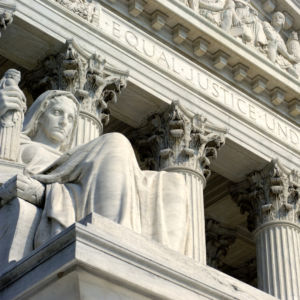As another case on forced union dues looks to move to the Supreme Court, California teacher Rebecca Friedrichs expressed her views on the case this week over a year after she also tried to end the practice.
Friedrichs led a group of teachers who filed a lawsuit against the California Teachers Association (CTA). The lawsuit could have ended mandatory union dues for all public-sector workers but failed due to a split at the U.S. Supreme Court. Illinois state worker Mark Janus is now trying to accomplish the same objective.
Janus filed the lawsuit alongside two other state workers. They have already petitioned the Supreme Court in the hopes it will take up the case. The Freedom Foundation and Friedrichs filed an amicus brief in support of Janus.
“The sad fact is that parents and educators no longer have a say in our public schools because teachers unions and the policymakers they help to elect have too much control over our education system,” Friedrichs said in a statement. “Wins for these cases could restore the voices of parents and teachers and aid us in doing what’s right for the children we love and serve.”
The Freedom Foundation’s legal brief focused on two main points. It argued the prior case that has allowed mandatory union dues should be readdressed. The legal brief also detailed why union dues payments should not be automatically deducted from paychecks.
“Teachers have paid significant dues to the unions,” Friedrichs said. “Public employees shouldn’t be forced to pay dues that support unions and politicians who don’t share our values.”
The Supreme Court case Abood v. Detroit Board of Education affirmed mandatory union dues when it was ruled in 1977. It did add that workers had the right to opt-out of political spending from unions. The Friedrichs case argued all union payments for public-sector unions are inherently political and thus should always be optional.
The Supreme Court issued a split decision in June 2016 due to the death of Justice Antonin Scalia. A tied decision defaults to the lower courts, which ruled against the lawsuit. Justice Neil Gorsuch has since filled the vacant seat. The Janus case is hoping to bring the arguments back now that the court is full.
The National Right to Work Legal Defense Foundation (NRTW) and the Liberty Justice Center (LJC) have both been assisting Janus and the other state workers. The American Federation of State, County and Municipal Employees (AFSCME) is the primary union named in the lawsuit.
The lawsuit argues public-sector collective bargaining and political lobbying are indistinguishable. Essentially, by virtue of being an entity that represents government workers, everything it does is political. The Seventh Circuit Court of Appeals ruled against the lawsuit March 21 by affirming an earlier district court decision.
Labor unions can require payments once they get voted in as an exclusive representative for a workplace. States that have right-to-work protections have outlawed that practice. A worker can petition to leave their workplace union in which case they are only required to pay a nonpolitical fee that can only cover the cost of representation.
Labor unions and their supporters argue that optional dues encourage workers to free-ride. Once a union gets voted in as an exclusive representative, it must represent all workers whether they pay dues or not. The free-ride argument is used against both lawsuits challenging mandatory union payments and right-to-work laws.
The case poses a huge threat to labor unions since they rely heavily on the public-sector. The Bureau of Labor Statistics (BLS) reported that the union membership rate stands at 34.4 percent for public-sector workers, but only 6.4 percent for private. It’s unclear how many public-sector workers would leave their unions.
Illinois Republican Gov. Bruce Rauner prompted the lawsuit early in his term. He issued an executive order in 2015 directing the state to stop taking union fees from state workers who were not union members. The governor also filed a lawsuit in federal court, asking it to affirm his decision was legal.
Illinois Attorney General Lisa Madigan and some state unions argued the governor didn’t have standing to bring the lawsuit because he didn’t have to pay union dues or fees. A person with legal standing has a right to bring a lawsuit because they were harmed by a law or action.
The NRTW and LJC decided to intervene when they saw the case was in trouble. They started by offering legal assistance to the three state workers. A federal judge ruled a short time later that the governor did not have standing to proceed with the case, but the three state workers did.
House Republicans introduced a bill last week aimed at making union dues and fees optional for all workers. Republicans hold a congressional majority, making its passage a possibility. President Donald Trump has already expressed his support for right-to-work laws and is likely to sign such a bill.
AFSCME and its local affiliate did not respond to requests for comment by InsideSources.

